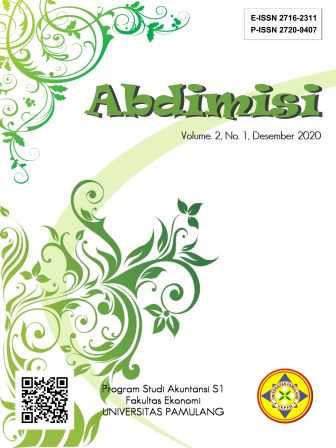Pengembangan Kompetensi Akuntansi dan Perpajakan Siswa SMK Mitra Bakti Husada – Bekasi
DOI:
https://doi.org/10.32493/abms.v2i1.7896Keywords:
Competence, Accounting, TaxationAbstract
Professional competence as a pharmacist assistant really needs to be equipped with accounting and tax knowledge. Entering the business world, inevitably, in order to be successful, it must be done professionally, namely equipped with the skills to manage finances and taxes, so that in managing finances, students need to be equipped with this knowledge. The training programs that will be provided are accounting and tax. The program was chosen because it was considered important and was expected to provide education to these students. Accounting and tax materials are important materials as a provision for them to increase their ability to become entrepreneurs. By mastering accounting and taxes, it is expected that they can manage their business by compiling accounting and tax (fiscal) financial reports according to applicable standards.
References
Aminah. (2014). Penerapan Diskusi Kelompok pada Mata Pelajaran Perpajakan untuk Meminimalkan Kesalahan Siswa. Jurnal Pendidikan Ilmu Sosial. 24(2): 93-108.
Arifin, Zainal. (2012). Implementasi Manajemen Stratejik Berbasis Kemitraan dalam Meningkatkan Mutu SMK. Jurnal Universitas Pendidikan Indonesia. XIV(1): 1-5.
Chasanah, Laela Meni’ Nur. (2014). Pengaruh Motivasi Belajar Perpajakan, Keaktifan Peserta Didik, Disiplin Belajar, dan Intensitas Mengerjakan Soal Latihan Perpajakan terhadap Prestasi Belajar Perpajakan Peserta Didik. Economic Education Analysis Journal, 3(2): 1-5.
Dhofier, Zamakhsari. (2011). Tradisi Pesantren Studi tentang Pandangan Hidup Kiai dan Visinya Mengenai Masa Depan Indonesia, cet. ke-9, LP3ES, Jakarta.
Mardiasmo. (2006). Perpajakan. Yogyakarta. Andi.
Nafisah, K., Margunani, M., & Latifah, L. (2015). Faktor-faktor yang Mempengaruhi Hasil Belajar Siswa Akuntansi. Economic Education Analysis Journal, 4(1).
Nashiroh, Marfuatun dan Sukirno. (2020). Peningkatan Aktifitas dan Hasil Belajar Akuntansi melalui Implementasi Model Pembelajaran Kooperatif Teams Games Tournament. Jurnal Pendidikan Akuntansi Indonesia. 18(1): 20-35.
Perwita, Dyah. (2017). Upaya Guru Sekolah Menengah Kejuruan (SMK) dalam Meningkatkan Minat Berwirausaha Siswa. Jurnal Pendidikan Ekonomi UM Metro. 5(2): 9-14.
Poerwadarminta, WJS. (2003). Kamus Umum Bahasa Indonesia. Jakarta. Balai Pustaka.
Setyawan, Cornelius Hery. (2012). Peningkatan Hasil Belajar Perpajakan melalui Media Taxi Snaders pada Siswa. Jurnal Pendidikan Ekonomi Dinamika Pendidikan. VII(1): 53-66.
Sodikin, Sodikin Slamet Sugiri dan Riyono, Bogat Agus. (2019). Akuntansi Pengantar 1, Edisi Kesembilan.
Downloads
Published
Issue
Section
License
Copyright Notice
Authors who publish with this journal agree to the following terms:
- Authors retain copyright and grant the journal right of first publication with the work simultaneously licensed under a Creative Commons Attribution License that allows others to share the work with an acknowledgement of the work's authorship and initial publication in this journal.
- Authors are able to enter into separate, additional contractual arrangements for the non-exclusive distribution of the journal's published version of the work (e.g., post it to an institutional repository or publish it in a book), with an acknowledgement of its initial publication in this journal.
- Authors are permitted and encouraged to post their work online (e.g., in institutional repositories or on their website) prior to and during the submission process, as it can lead to productive exchanges, as well as earlier and greater citation of published work (See The Effect of Open Access).
Abdimisi have CC-BY-SA or an equivalent license as the optimal license for the publication, distribution, use, and reuse of scholarly work.
In developing strategy and setting priorities, Abdimisi recognize that free access is better than priced access, libre access is better than free access, and libre under CC-BY-SA or the equivalent is better than libre under more restrictive open licenses. We should achieve what we can when we can. We should not delay achieving free in order to achieve libre, and we should not stop with free when we can achieve libre.
You are free to:
- Share — copy and redistribute the material in any medium or format
- Adapt — remix, transform, and build upon the material for any purpose, even commercially.
- The licensor cannot revoke these freedoms as long as you follow the license terms.

